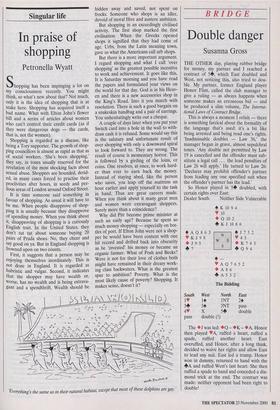BRIDGE
Double danger
Susanna Gross
THE OTHER day, playing rubber bridge for money, my partner and I reached a contract of 5+, which East doubled and West, not noticing this, also tried to dou- ble. My partner, former England player Honor Flint, called the club manager to give a ruling — as always happens when someone makes an erroneous bid — and he produced a slim volume, The Interna- tional Laws of Contract Bridge.
This is always a moment I relish — there is something farcical about the formality of the language that's used: it's a bit like being arrested and being read one's rights. Inadmissable doubles — Law 36,' the manager began in grave, almost sepulchral tones. 'Any double not permitted by Law 19 is cancelled and the offender must sub- stitute a legal call ... the lead penalties of Law 26 will apply.' He turned to Law 26: `Declarer may prohibit offender's partner from leading any one specified suit when the offender's partner has the lead.'
So Honor played in 5+ doubled, with certain rights over East: Dealer South Neither Side Vulnerable 4 K 10 9 4
♦ 10
• Q 10 2 • K J 10 8 6 4 A Q 8 6 3 J 7 5 2 • K J 9 8 V 4 3 47 Q 9 4
• J 9 5 • K 7 4 3
N W E
S
4 — IP A Q 7 6 5 2
• A 8 6 + A 5 3 2
The Bidding
South West North East 111 14 1NT 24 3+ 34 3NT pass 4, X 5f double pass double (!) The •J was led: •Q – •K – +A. Honor then played IIPA, ruffed a heart, ruffed a spade, ruffed another heart. East overuffed, and Honor, after a long think, decided to waive her rights and allow East to lead any suit. East led a trump. Honor won in dummy, returned to hand with the 4A and ruffed West's last heart. She then ruffed a spade to hand and conceded a dia- mond trick at the end. The contract was made: neither opponent had been right to double!





























































































 Previous page
Previous page